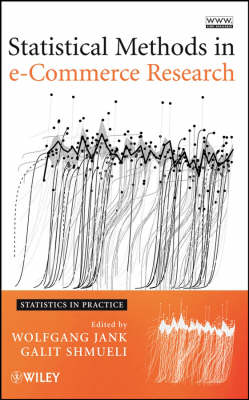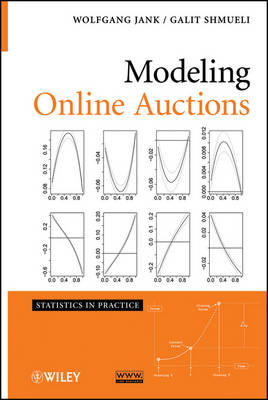Statistics in Practice
2 primary works
Book 33
Statistical Methods in e-Commerce Research
by Wolfgang Jank and Galit Shmueli
Published 1 January 2008
This groundbreaking book introduces the application of statistical methodologies to e-Commerce data With the expanding presence of technology in today's economic market, the use of the Internet for buying, selling, and investing is growing more popular and public in nature. Statistical Methods in e-Commerce Research is the first book of its kind to focus on the statistical models and methods that are essential in order to analyze information from electronic-commerce (e-Commerce) transactions, identify the challenges that arise with new e-Commerce data structures, and discover new knowledge about consumer activity. This collection gathers over thirty researchers and practitioners from the fields of statistics, computer science, information systems, and marketing to discuss the growing use of statistical methods in e-Commerce research. From privacy protection to economic impact, the book first identifies the many obstacles that are encountered while collecting, cleaning, exploring, and analyzing e-Commerce data. Solutions to these problems are then suggested using established and newly developed statistical and data mining methods.
Finally, a look into the future of this evolving area of study is provided through an in-depth discussion of the emerging methods for conducting e-Commerce research. Statistical Methods in e-Commerce Research successfully bridges the gap between statistics and e-Commerce, introducing a statistical approach to solving challenges that arise in the context of online transactions, while also introducing a wide range of e-Commerce applications and problems where novel statistical methodology is warranted. It is an ideal text for courses on e-Commerce at the upper-undergraduate and graduate levels and also serves as a valuable reference for researchers and analysts across a wide array of subject areas, including economics, marketing, and information systems who would like to gain a deeper understanding of the use of statistics in their work.
Finally, a look into the future of this evolving area of study is provided through an in-depth discussion of the emerging methods for conducting e-Commerce research. Statistical Methods in e-Commerce Research successfully bridges the gap between statistics and e-Commerce, introducing a statistical approach to solving challenges that arise in the context of online transactions, while also introducing a wide range of e-Commerce applications and problems where novel statistical methodology is warranted. It is an ideal text for courses on e-Commerce at the upper-undergraduate and graduate levels and also serves as a valuable reference for researchers and analysts across a wide array of subject areas, including economics, marketing, and information systems who would like to gain a deeper understanding of the use of statistics in their work.
Book 76
Explore cutting-edge statistical methodologies for collecting, analyzing, and modeling online auction data Online auctions are an increasingly important marketplace, as the new mechanisms and formats underlying these auctions have enabled the capturing and recording of large amounts of bidding data that are used to make important business decisions. As a result, new statistical ideas and innovation are needed to understand bidders, sellers, and prices. Combining methodologies from the fields of statistics, data mining, information systems, and economics, Modeling Online Auctions introduces a new approach to identifying obstacles and asking new questions using online auction data. The authors draw upon their extensive experience to introduce the latest methods for extracting new knowledge from online auction data. Rather than approach the topic from the traditional game-theoretic perspective, the book treats the online auction mechanism as a data generator, outlining methods to collect, explore, model, and forecast data.
Topics covered include: * Data collection methods for online auctions and related issues that arise in drawing data samples from a Web site * Models for bidder and bid arrivals, treating the different approaches for exploring bidder-seller networks * Data exploration, such as integration of time series and cross-sectional information; curve clustering; semi-continuous data structures; and data hierarchies * The use of functional regression as well as functional differential equation models, spatial models, and stochastic models for capturing relationships in auction data * Specialized methods and models for forecasting auction prices and their applications in automated bidding decision rule systems Throughout the book, R and MATLAB software are used for illustrating the discussed techniques. In addition, a related Web site features many of the book's datasets and R and MATLAB code that allow readers to replicate the analyses and learn new methods to apply to their own research. Modeling Online Auctions is a valuable book for graduate-level courses on data mining and applied regression analysis.
It is also a one-of-a-kind reference for researchers in the fields of statistics, information systems, business, and marketing who work with electronic data and are looking for new approaches for understanding online auctions and processes. Visit this book's companion website by clicking here
Topics covered include: * Data collection methods for online auctions and related issues that arise in drawing data samples from a Web site * Models for bidder and bid arrivals, treating the different approaches for exploring bidder-seller networks * Data exploration, such as integration of time series and cross-sectional information; curve clustering; semi-continuous data structures; and data hierarchies * The use of functional regression as well as functional differential equation models, spatial models, and stochastic models for capturing relationships in auction data * Specialized methods and models for forecasting auction prices and their applications in automated bidding decision rule systems Throughout the book, R and MATLAB software are used for illustrating the discussed techniques. In addition, a related Web site features many of the book's datasets and R and MATLAB code that allow readers to replicate the analyses and learn new methods to apply to their own research. Modeling Online Auctions is a valuable book for graduate-level courses on data mining and applied regression analysis.
It is also a one-of-a-kind reference for researchers in the fields of statistics, information systems, business, and marketing who work with electronic data and are looking for new approaches for understanding online auctions and processes. Visit this book's companion website by clicking here

